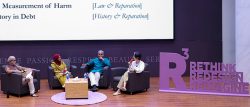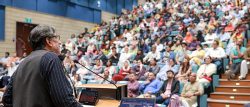Talk delivered by Dr. Oliver Faust outlines the challenges and rewards of teaching electronics with hands-on projects in challenging environments
HABIB UNIVERSITY, December 17, 2015: A Public Lecture held here on Tuesday, December 15 examined the challenges and rewards of teaching introductory level electronics to first-year university students.
The talk was delivered by Dr. Oliver Faust, Associate Professor of Electrical Engineering here at Habib University, and drew from a paper titled “Getting Practical with Digital: An Integrated Electronic Design Project for Undergraduates,” which has been co-authored by five members of Habib University’s School of Science & Engineering (SSE) faculty.
Dr. Faust started his talk by outlining the problem faced by Habib University’s SSE faculty: How do you teach, design and implement modern electronic systems? He elaborated that, generally speaking, students have insufficient will to carry through modern electronic projects; do not have sufficient knowledge; struggle due to poor supervision; have unclear goals and weakly defined outcomes; and lack sufficient funding to acquire key components.
Dr. Faust then explained Habib University’s approach to resolving these problems. Fundamental to doing a good job in teaching electronic design, Dr. Faust said, is proper planning and an understanding of systems engineering. Answering each of the challenges he laid out in the beginning of the talk, he explained that they could be countered by understanding the need of the project, which creates the will to do it; structuring tasks to aid the learning necessary to complete the given project; and planning supervisory roles to ensure students have proper guidance. He explained that a good understanding of systems engineering provides clear goals, while the design methodology applied to a project helps to clarify these goals and set budget constraints as the project moves along.
Guided by these principles, the Habib University faculty undertook various projects with their students. These included a digital to analogue converter circuit; BlueSteps – a Bluetooth-based stepper motor control system; and a mobile robot. Dr. Faust broke each project down into the challenges facing students at their outset and how they responded to them. He explained how the project was first understood, then its requirements delineated, then how students would go about resolving the requirements outlined, and finally their creations implemented and tested.
Based on the faculty’s experiences with these projects, Dr. Faust made a number of interesting observations. He explained that it is possible to work on projects with an international impact in a highly restricted environment if you have a solid understanding of systems engineering and are creative in using different resources to get what you are aiming for. As an example of this, he explained how – when he was supervising the mobile robot project – his team observed that flying robots can crash and damage, leading to budgetary troubles. They worked around this challenge by doing the project with a robot that had wheels.
The talk offered interesting insights into Habib University’s School of Science & Engineering, and had important lessons for teachers wanting to introduce similar projects in other universities.




